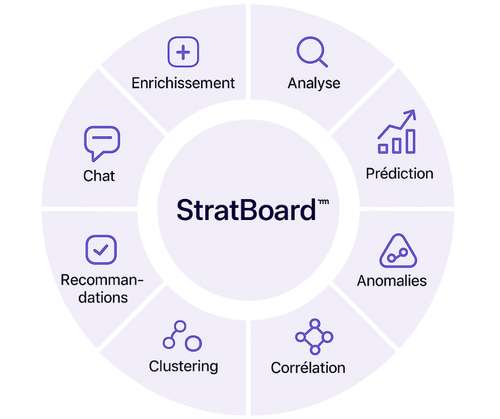New partnership !
For several months now, part of the team has been working on developing a new partnership. This partnership is with the French company Strat37. We are pleased to officially announce that we are their first partner in Belgium! On Thursday, June 26, we had the pleasure of welcoming them to our conference with several of our partners.
What is Strat37?
Strat37 is a French AI and data agency based in Paris, recently founded by Jonathan Delmas and Grégoire Mariot. They offer services in data cleaning, enrichment, and analysis using artificial intelligence. In addition, they have developed a solution called StratBoard™.
What is the StratBoard™?
StratBoard™ is an AI solution that transforms raw data into actionable insights for quick, fact-based decisions. It has been designed to integrate seamlessly into the daily workflows of business teams.

Their target audience
Business teams (marketing, sales, operations, finance) that need quick and clear answers to their questions, without having to rely on a data specialist or wait for a report.
Distinguishing features
- Conversational interface allowing users to query data using natural language
- Automatic detection of anomalies and trends that are difficult to see with the naked eye
- Ability to cross-reference previously scattered or unconnected data
- Scalable solution that adapts to the challenges and business contexts of each customer
- Available in the cloud or on-premise, depending on security constraints
The project with one of our partners
Our partner is a real estate operator specializing in office buildings, meeting centers, and coworking spaces. We conducted a test internally in collaboration with Strat37 to assess the potential of AI in automating invoice processing. The initial issue concerned energy bills (water, gas, electricity). While accounting data can be easily extracted thanks to its integration into the accounting system, energy information—such as consumption volumes or meter numbers—cannot be extracted from the PDF.
The primary objective of the test was to verify whether AI could automatically extract this specific data from invoices. The results were very positive: the AI was able to accurately identify consumption and associated meters, which made it possible to build an energy consumption monitoring dashboard for two pilot buildings. This dashboard provides centralized visibility into consumption trends and meters.
In a second phase, we expanded the scope of the test to include the classification of invoices by type, relying solely on an initial OCR reading of the document. The objective was to automatically distinguish, for example, maintenance invoices, those related to elevators, etc. The AI was able to propose a relevant initial categorization, although some refinements are still necessary before it can be put into production. This could make it easier for operational teams to track different expenses more clearly.
In summary, these initial AI tests have been conclusive. They demonstrate the technical feasibility and operational usefulness of AI in enhancing existing processes. This experiment paves the way for new concrete use cases in production environments.

